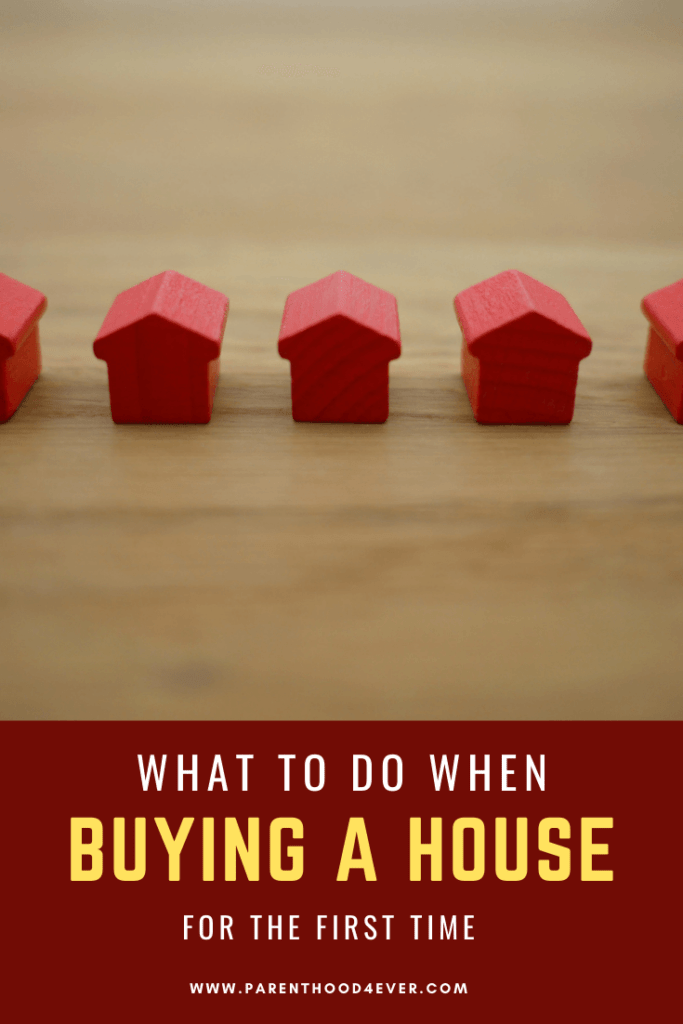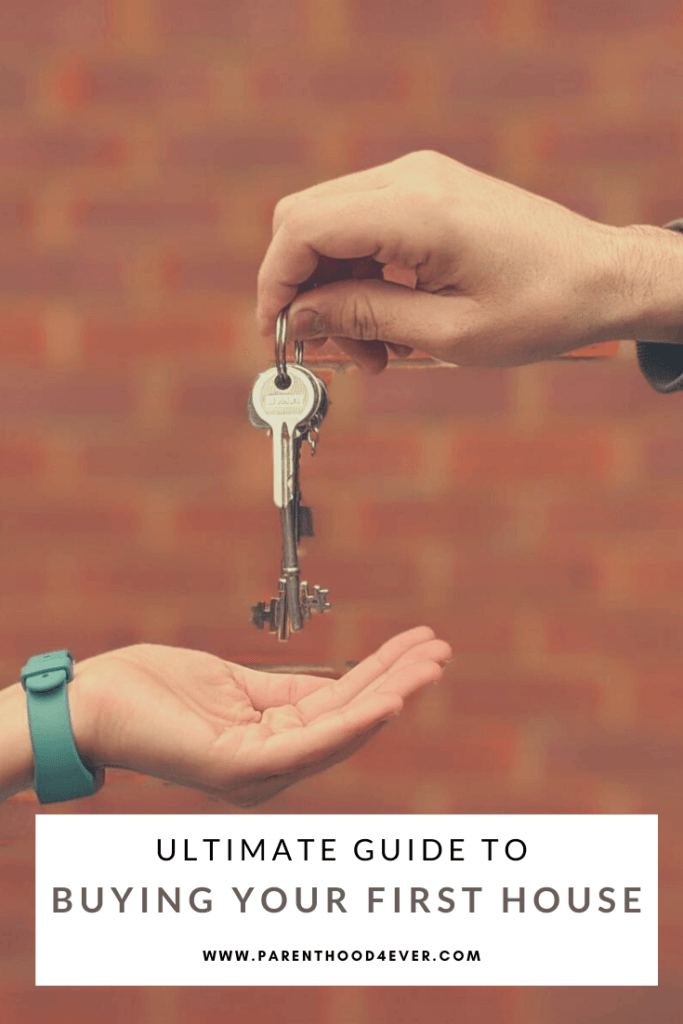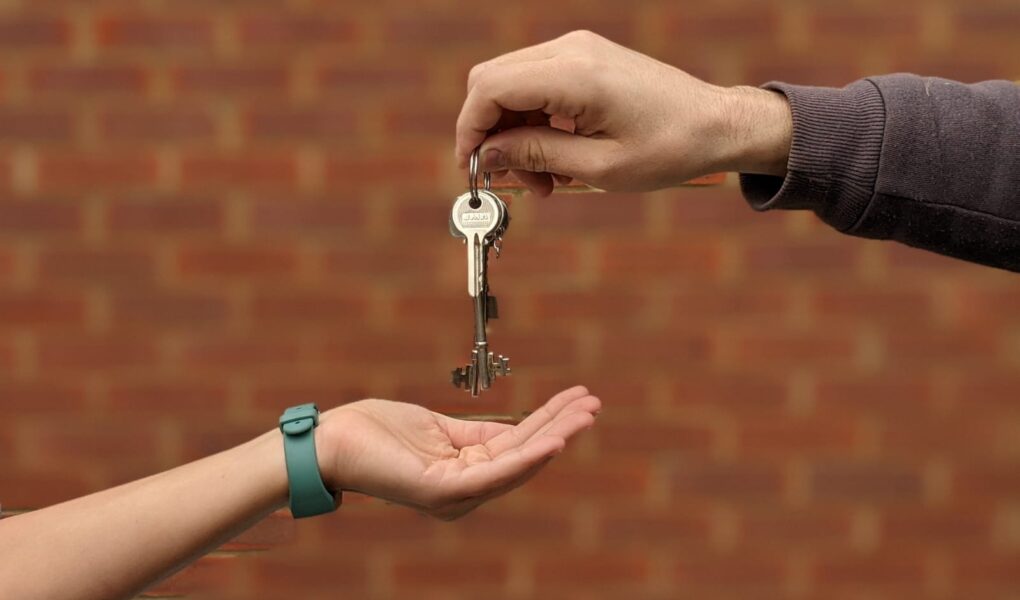As much as I was excited to purchase our first property in the UK, that feeling has slowly faded during the process. Unlike other countries where you get a mortgage for the whole time and seal the deal within the first month, buying a property in the UK may be a process that can take you up to six months. In our case, it was a year.
In this article, let’s find out what to do when buying a house for the first time, discuss in detail steps for first-time home buyers, and review what is the process of buying a house. You will get everything you need to know about buying a house in the UK, as well as learn a couple of tricks dealing with estate agents, brokers, solicitors, and surveyors.
- Find out what you can afford
- How much deposit do I need to buy a house?
- Choose your mortgage broker
- Evaluate your mortgage potential
- Prepare the documentation
- The Decision in Principle (DIP) or Agreement in Principle (AIP)
- Check your credit score
- Review first-time buyer scheme
- Consider additional costs involved in the process of buying a house
- What to do when buying a house for the first time
Find out what you can afford
At the initial step, there are things to consider when buying a house for the first time. It is very important to figure out the following points:
- How much savings do I have?
- What is the best mortgage product I can afford?
- What documentation do I need to present?
- What is my current credit score and how can I improve it?
- Shall I choose one of the First Time Buyer Scheme?
- Are there any other costs incurred in the process of buying a house in the UK?

How much deposit do I need to buy a house?
As a first-time buyer, you will be required a 10% deposit of the total price of the property you want to get. So, for example, if your house costs £450,000.00, you will be required to put down £45,000.00 as a deposit and borrow the remaining £405,000.00. It is very rare that you can get a 5% deposit from the lender as a first-time buyer, but the chances are there. You should always discuss your options with the mortgage broker. He will provide you with all the necessary information and tips for buying your first home.
Also, consider the interest rate, as it will grow if you put a 5% deposit as opposed to 10%.
You are very welcome to pay more than 10% deposit. For example, in case if your mortgage doesn’t cover the full price for the house you wish to buy, you always can consider topping it up.
Choose your mortgage broker
When buying a property in the UK for the first time, it is highly recommended to hiring a good mortgage broker who will do his best to secure you with the mortgage deal at the time.
The mortgage broker is one of the most essential elements when buying a property for the first time. Simply because if you do not have a lender, you won’t be able to buy a house with a mortgage. It is important to spend some time and research the best mortgage advisor.
The reference is always a good way to go, but research also is the key. We used Alexander Hall which is considered to be one of the top companies securing mortgages. And if you think it is expensive because it is the best, you are wrong. They have an extremely reasonable price and access to almost every single lender in the UK which has a direct impact on your interest rate and the overall mortgage deal. Also, they advise on all the steps to buying a property.
It is important to note that every mortgage broker is different. Before sealing the deal, ask what type of mortgage advisor he is:
- Tied Brokers: they are tied into one mortgage lender
- Multi-tied Brokers: they can offer products from a range of providers
- Independent Brokers: they are usually more experienced and more likely to get you the best deal available.
You want to consider an independent mortgage broker. During your first meeting, inquire what happens when you need to re-mortgage your property, and what other services they provide you with.
Note: You must be very careful when applying for a mortgage. Once your application is declined, it will be shown to all other lenders that you will apply for in the next run. The chance they won’t take a risk is high. This is why, it is important to have a good mortgage advisor who knows exactly how to speak their language, fill out all the necessary forms, and knows how to buy a house in UK securing you with the best deal possible.
Evaluate your mortgage potential
When you choose your mortgage broker, it is wise to understand what loan you can get from the lender at the time of purchase.
There are several mortgage calculators where you can find out what would be the approximate amount you can borrow. But to know for sure, you shall ask your mortgage advisor to run the check, select a few options, and provide you with a few lenders’ offers.
Then you should ask the mortgage advisor to secure your DIP (Decision in Principle) with the lender you chose.
Prepare the documentation
As one of the first steps to buying a house, you should prepare the documentation that you will be asked by the mortgage advisor and the lender to be able to secure you with the mortgage. Here is the list for you to consider:
- Proof of ID, e.g. passport or driver’s license
- Proof of address, e.g. utility bills for the last three months, lease contract
- Proof of earnings, e.g. payslips, accounts, current P60, tax calculations if self-employed, employment contract, etc.
- Proof of deposit.
- Proof of income and expenditures, e.g. bank statements for the last three months, including saving accounts and overseas accounts
- Monthly Expenditure Form. This is a form detailing your monthly expenditure, and usually, it is filled at the first meeting with the mortgage advisor.
- Your credit score (see the information below).
The Decision in Principle (DIP) or Agreement in Principle (AIP)
The Decision in Principle (DIP), also known as Agreement in Principle (AIP), is a promise from the lender to grant you the mortgage loan you want on the condition that the information you’ve provided is correct.
When you have got all documentation ready, forward it to your mortgage broker and let him do his job. He will contact the lender who will run financial and laundering checks. This includes but is not limited to the following:
- Employment history
- Salary and other income
- Overall expenses. The most important will be a rental fee, childcare or school fees, utility bills, food, and other monthly purchases. Childcare is a very important expenditure as the cost usually is high, so it is essential to provide information on the schemes and government support you get.
- Your credit score (see information below)
- Debts, loans, or defaults
- Other financial commitments
- Monthly expenditure form
Check your credit score
One of the other stages of buying a house is checking your credit score. The credit score is the number from 300 to 850 that tells your lender how likely he is to lend you the money, and how much risk is involved.
It considers various factors, but mainly it is a financial analysis based on individual credit files. One of the main requirements is that you should have a credit history in the UK for not less than three years, however, if you don’t (we didn’t), you will still be able to get a mortgage at a good rate.
The two major companies where you can check your credit score are
Remember: Your credit score analyzes the dealings of your credit card, so it is essential you have one. It is also advisable to set up a direct debit for one of the utility bills you have or your phone bill and make some small purchases from time to time.
Tip: you must always pay your credit bills on time; therefore, it is a good idea to set up the direct debit with your debit card. If you get a debt, it will have a bad impact on your score.
Review first-time buyer scheme
When buying a property in the UK, consider using a first buyers scheme.
Help To Buy for first-time buyers has quite a few options. You usually are allowed to enter the scheme if you are a first-time buyer, and you will be able to buy the property paying only a 5% deposit for a new built.
The government supports the following options:
- Help To Buy Equity Loan
- Help To Buy Shared Ownership
- Help To Buy ISA has been closed to new accounts on 30 November 2019.
- Lifetime ISA
Consider additional costs involved in the process of buying a house
The best way to buy a house for first-time buyers is to consider all additional costs that will be involved in the process of buying your first house.
Deposit
You should have at least 10% before you start searching for your future home
Mortgage Broker/ Mortgage Advisor
Although a mortgage advisor comes at a cost, he is the one who can help you to secure the mortgage in the best way possible. Plus, a mortgage broker’s fee is usually very low compared to other additional fees.
Valuation Fee
The valuation fee is the fee you will be required by the lender to evaluate the property, so he makes sure it is at least worth the amount you want to borrow, and it is suitable for a mortgage.
Some lenders do not charge for the valuation as it is included in the offer. Sometimes lenders will be able to proceed with the remote online valuation or conduct a drive-through valuation without entering the property.
Conveyancing Solicitor
A conveyancing solicitor is the second important person after the broker who knows exactly how to start the process of buying a house. As soon as you have received the mortgage offer for the property, the solicitor becomes your main point of contact and all legal works start to be carried out.
There are lots of solicitors to choose from and some research must be done. It may be someone who you have been referred to, or you can compare the solicitors here and choose the best one that fits you.
Stamp Duty
Stamp Duty is a form of tax that you pay on properties over a certain price in England and Northern Ireland. The tax rate depends on several factors, for example, if you buy the property to let, you will pay more tax than if you have bought a house for yourself.
Stamp Duty rates change every year, you should check them here. You do not need to pay a Stamp Duty if your house value is less than £300,000.00 GBP. Sometimes you are exempt from paying the Stamp Duty too, for example, during Covid-19 the Stamp Duty was 0% for anyone who purchases the property under £500,000.00 GBP.
Surveyor
As one of the important steps to buying a house for the first time, you may require a surveyor service. Surveyor is a person who will come to the property you wish to buy and do a thorough check of the entire house. There is a lot of surveyors to choose from and, honestly, based on my own experience, I would do research before I pick the surveyor. Check here for the list of surveyors.
The cost ranges anywhere from £500 to £1000 for a home survey and £800 to £1500 for a building survey.
You also may consider and add as an additional cost a plumber, electrician, and structural engineer. These are important people you wish to get an opinion from.
More details about surveyors are explained below under the title “Surveyor”.
Home and Building Insurance
This is something you will be required before taking possession of. There are tons of insurances out there. You may want to make a research.
Removal Companies
If you have got a lot of things to pack and move, you always have an option to invite removal experts in this field. The small team will come with all the essential packing materials and pack the entire house for you in a split of a second. Later, everything will be taken to your new property, while you enjoy a farewell party on your patio.
This type of service starts from £700 and depends on how many rooms and what type of furniture you have.
On the other hand, you can move by yourself by hiring a transport van, which was our option. We always get a van from Zipcar which costs us £10 per hour. The good thing about it is that it is cheap and you can work things out at your own pace.
Other additional costs you may consider
- Mortgage Protection Insurance
- Council Tax
- Utility bills
- Home Repairs
- Locks, alarm system, and security
- Furniture and extras

What to do when buying a house for the first time
Once you know how much you can spend on a property, you can start your search.
Search for the property
So, let’s break the search down to some points to ease up the process.
Choose the location you want to buy the property in
This includes but is not limited to
- getting the reference from your relatives and friends,
- doing offsite research by checking on all possible statistics and reports on the Council’s page of the borough you wish to live in. Using Google for criminal records, floods, and general information is a plus too.
- Proceed with the onsite research by paying multiple visits to an area, talking to people on the street, getting to know your future neighbors, checking on schools and childcare in the area, visiting cafes, shops, and other places.
There is nothing more valuable than speaking to people, they will give you interesting information that you will never find anywhere else, so don’t be shy! This is also one of the most important pieces of advice on how to buy a property in London. You put a lot of money after all.
Understand what property type you would like to buy
There are several property types you may consider:
Leasehold
Leasehold refers to apartments or houses where the land belongs to a landlord. In this case, anything that happens with a building should be the responsibility of the landlord. This also means that if you would like to make any type of alterations in the house or apartment, you must get the landlord’s permission before carrying out works with your council and the planning department.
Note: You should always ask how many years of the lease you have for the property. It is normal if you have got over 90 years, but it can’t be less than 70 years. If it is, you should ask if the seller extends the lease before you take possession. In case if not, the house value will be visibly cheaper, but you should understand what will be the cost of extending the lease.
Share of Freehold
This is when you share the property. It is typical that one Victorian house is split into two or three parts. In this case, you will share the land’s ownership with other neighbors. You should check with your solicitor what the arrangement is in case if something happens with the building, for example, roof, exterior walls, base, etc.
Freehold
Freehold is when you completely own the property and the land. You get the responsibility but you are free to do whatever you want on your property (well, with council permission if you wish to build or extend your property)
Check available properties on the market
There are several free platforms that you can use to understand what is available at your budget at the moment, such as Zoopla or Rightmove.
These sites will provide you with tips on how to buy a house and relevant stats on the property. For example, you can see when the property was last sold, how many times it was sold, how long it has been on the market, etc.
You can also analyze similar properties in the area (even the ones that are not on sale) to understand the average price for the type you are looking for.
You will find out that every property is listed by an estate agent. It is always better to call.
Reach out to the estate agents
As soon as you start reaching out to the estate agents, they will be asking you tons of questions to register you in their database and send you available properties. So, by that time you should already know what you want to give specific instructions to the estate agents. It would be a plus if you have an AIP from the lender, a contact of your broker, and a solicitor. Some estate agents won’t accept your offer without these things.
Estate agents will also be able to tell you what to do when buying a house for the first time.
The advantage of every estate agency is that they can have nice options that are not listed on the website. Within some time, you will get an idea of which estate agencies are for you and which are not.
Arrange the viewings
If you are interested in the property, arrange the viewing as soon as possible. Good properties do not wait for long. Sometimes it is a fight indeed!
When you are at the property, check the following:
- Is there enough storage space?
- Are there enough electrical sockets and what condition are they in?
- What is the plumbing like?
- Is the house soundproof?
- Do the drains look like they adequately do their job?
Think of the space you buy. Sometimes it is better to buy bigger spaces you can do some extra building or extensions. When you are at the property, imagine what works you should do initially and what works you could potentially do in the future.
Make an offer to a property
My personal advice:
- Do not wait until making an offer. Make the offer and then check the details.
- You can and should make an offer to several properties if you like them all. At initial step, the deal can fall apart quicker than you think, especially during negotiations.
- As a first-time buyer, it is always good to have options and back-up plan.
- Do not trust the first seller, ask questions, be persistent, and check thoroughly on every step you are making.
IMPORTANT: Understand that until you exchanged the contracts, there is no legally binding agreement, this means that the deal can fall apart at the latest stage when you paid for the solicitor, surveyor, and other services. If there is a better offer down the line, the seller can change his mind and choose another buyer.
In fact, the process doesn’t always seem to be straightforward or fair. Sometimes, the seller can get a wrong impression, or there can incur some other factors with the mortgage that nobody was aware of at the beginning.
For example, as a London first-time buyer, I didn’t get the deal for the house I dreamt of and gave the best offer among all seven buyers simply because the seller was waiting for approval from the house he wished to buy. He also made the best offer, but his seller decided to go with the lower offer which was chain-free thinking that the chain-free buyers are generally quicker to proceed with the deal.
And that is not always the case. Both of us were devastated, when in two months the estate agent called and offered the same deal, even for a lower price. What happened is that a chain-free buyer couldn’t proceed with the deal. Unfortunately, in our case, the finances have changed due to unforeseen lockdown, and we were not able to secure the mortgage at the same value anymore.
This was not the only example. We got even worse with the first offer where our application was completely withdrawn after five months simply because the bank surveyor realized that the same bank wanted to lend money to both families buying a share of freehold for the same house which is a lot of risk for a lender.
Things may happen. Be patient. Be positive. You will achieve the goal by any means.
Secure the mortgage
When you chose the property, and your offer was accepted, you now can contact your broker to secure the mortgage for you. This can be done for the specific property only. If down the line something goes wrong, you always can change the property by proceeding with a changeover. It will normally take the bank a couple of weeks, and some additional checks are possible too.
The estate agent will need to send a memorandum to all parties for your mortgage broker to start the process. Usually, it may take up to two to four weeks to get the official mortgage offer from the lender. However, every lender is different. It took us three months with the first lender, while we secured the mortgage with the second lender in two weeks.
Bank Valuation
Bank valuation is a very important step because if the lender decides it is not worth the agreed purchase price, then you won’t be able to borrow the amount you want, but it will be a good point to re-negotiate the price with the seller.
When does valuation happen?
Different lenders have different rules. A valuation can happen before or after the DIP. You should check with your mortgage broker.
Mortgage offer
After the full mortgage application has been submitted and points were clarified, there will be conducted a few checks, including the laundering check.
Once the mortgage underwriter collects all the information and makes a positive decision, you are ready to receive the mortgage offer, a legal document, that states the amount you borrow and all related terms and conditions.
Check the property
It is time to contact your conveyancing solicitor
Once you receive the mortgage offer, you need to instruct your solicitor to commence working on all the legal work required to purchase the property.
This includes but is not limited to
- Search Results:
- Planning or Building Regulations Insurance
- Groundsure Avista – a very important document that will guide you through contaminated land liability, flood risk, ground stability, radon, energy, transportation, planning constraints, and applications. It will talk about the subsidence too which is extremely important to pay your attention to.
- Drainage and water search
- Other related searches
- Title Documents:
- Boiler report
- Contract
- EPC (Energy Performance Certificate) will let you understand the energy performance and what you can do to improve it.
- Official Copy of Register of Title
- Title Plan
- TA10 which is fittings and contents form
- Other
- SDLT (Land Transaction Return
- Mortgage Deed
There are more, but don’t worry. You will be guided through every single step at a time.

Book the Surveyor
Booking a surveyor is optional and can be done at any time. Talk to your solicitor about the best time of booking it.
There are mainly two types of surveys: home surveys and building surveys. A home survey is required when you purchase a flat, or a part of the house. A building survey is when you purchase the house.
How much does the surveyor cost?
The cost ranges anywhere from £500 to £1000 for a home survey and £800 to £1500 for a building survey.
What is the difference between home and building surveys?
As mentioned before, your choice depends on the property type you buy. But the main difference is that you will see the budget you will need to spend in a particular amount of time for various things in the house that may break or get old within years, such as boiler, roof, pipes, etc.
Is surveyor a mandatory?
No. The surveyor is optional and comes at your expense. However, the bank surveyor is mandatory (see “valuation fee” above).
What do I need to keep in mind when calling out the surveyor?
The general surveyor will check the entire building, that said, he is not an expert in any specific trades. The general surveyor will tell you what the roof is made of, what type of walls you have, he will check windows and the general condition of the property. He, however, will try to avoid taking any responsibility if something goes wrong down the line.
The general surveyor also won’t touch anything that he can’t have access to, for example, if you don’t have the ladder, he won’t be able to check the condition of the loft. If the boiler is switched off (which is obviously the case), he won’t turn it on either.
So, it is important to keep in mind that apart from the general surveyor, you may want to find an electrician and a plumber to give you a thorough report on what is going on with the property.
Why do I need the general surveyor?
Well, you may never notice what the general surveyor will be able to point out. In our case, he found a couple of cracks on the exterior wall which led to a serious risk of subsidence. As the result, the seller called out the structural engineer and took care of all the related fees.
It might be not the case, and the seller may refuse to take care of any additional surveys. In this case, you have an option to invite the structural engineer at your own cost or withdraw the application and find another house.
Now after the whole process has been finished, I may say, plumber, electrician, and structural engineer are people you wish to get an opinion from.
Lastly, keep in mind that all surveyors must be registered with RICS (Royal Institution of Chartered Surveyors)
Exchange of Contracts
Once you confirm all the details with the solicitor, surveyor, and other institutions that provided you with information on the property, you now can set up the date to exchange the contracts.
The solicitor will guide you through every single detail, so don’t worry. But get ready to be piled with the reports and absorb all hundred of pages.
To exchange the contract, you will need to sign and post by mail a few contracts, as well as a mortgage deed. Plus, you will need to transfer the deposit required to exchange the contract which is normally 10% of the deposit you have to pay for the property. If you change your mind after you have exchanged the contracts, the deposit won’t be refunded.
IMPORTANT: It is crucial to understand that you are buying the property for yourself. Don’t feel like you owe somebody and do what is right for you in the first place. If at any point during the purchasing process you feel you can’t afford this house, your financials change, there are too many issues with the property, you always have the right to pull out from the deal. It refers to the seller too. There are way too many factors involved in the process of buying a house, and it takes far too much time for these factors to take place. However, it is always important to stay transparent and honest. This way you will ensure everyone can reach their goals quickly.
Have you heard of Gazumping?
It is a term used to explain when your offer has been accepted and then just before all the paperwork is signed, the owner accepts a higher offer from someone else. This tends to happen in sellers’ markets where buyers abound. There are some things you can do to avoid being gazumped, for example, you can speed up the buying process, make sure that your estate agent has a policy on gazumping, or drafting up a contract upon agreement to avoid this issue.
So, to conclude…
After the exchange, everyone is then legally committed to buying or selling. It is also the last point beyond which you cannot withdraw from the purchase without losing money.
Completion Date
Lastly, you set the completion date. This is when you drive to the estate agency and pick up the keys from your new property.
It is possible to set the same date for both, exchange of contracts and the completion date. You should speak to your solicitor about this prior.
Prepare for a move
It is recommended to start preparing things for the move after you have exchanged the contracts simply because you want to make sure the deal will not fall apart at the last stage.
You should think about all utility companies and proceed with the following:
- Council tax: fill in the form or email to the council informing that you are leaving the old property and do the same for the new property informing that you are the new owner.
- Close or move your accounts for gas and electricity, water, and broadband. This shall normally be done at least one month prior to the move. For the electricity, we were happy with the Bulb service, they offer quite a low price among all UK providers and it is easy to communicate with them in general in case of any issues.
- Inform your childcare and start searching for a new option.
- Organize deep clean service for your old and new properties.
- Organize the removal service or hire a transport van.
- Pack.
- Arrange a farewell party!
If you are the one packing your belongings, here are some nice ideas on what to get to protect your stuff:
- Cardboard boxes
- Stackable storage boxes
- Packing Foam Sheets
- Packing Paper Sheets
- Labeled tape
- Tape
- Bubble Cushioning Wrap Roll
Note: At your new property you may have some questions about bin collections, waste, recycle center, how things work inside the house, so feel free to ask your neighbors and contact your council. They are always super helpful!
You are now the owner of your new house! Congratulations!
We know how hectic it may be to purchase a new property and how many questions can be arisen during the process. Leave your comment, we will be happy to help with any advice!
IMPORTANT: We created the Family Store especially for you. By clicking on the image below you can find anything from Newborn’s First Kit, Baby & Family Essentials, Kids Travel to Travel Gear. We hope you will find something valuable for your own adventures!
Our shop contains products from other companies that we love and use! Everything is based on our values of quality over quantity.
To get more support from parents and family travellers, join our Parenting Support Group.
And follow us on Instagram to know our crazy expat life!
If you liked the article, please spread the word by sharing our pin. We would highly appreciate it!
Also, check out:
- How to rent a property in the UK and set up utilities for the first time
- Want to move abroad? Here’s how to do it in one-month time: a step-by-step guide
- Things to consider when moving abroad with a toddler
- The Ultimate Guide To Children’s Centres And The Best Free Baby Activities In London
Welcome to check out our best product selection for parents and babies, including traveling gear and resources here.
This post may contain affiliate links that we may or may not receive a small commission for, at no extra cost to you. This helps to fund our blog but we never advertise for anything we don’t personally love or recommend. There is never any pressure to buy anything, we just like sharing things that make our life easier and help you find them if it is something you are looking for. Please, see our full disclosure here.














[…] Read More: What to do when buying a house in the UK for the first time. […]
[…] What to do when buying a house in the UK for the first time. […]
[…] What to do when buying a house in the UK for the first time. […]
[…] Buying the property in the UK for the first time […]